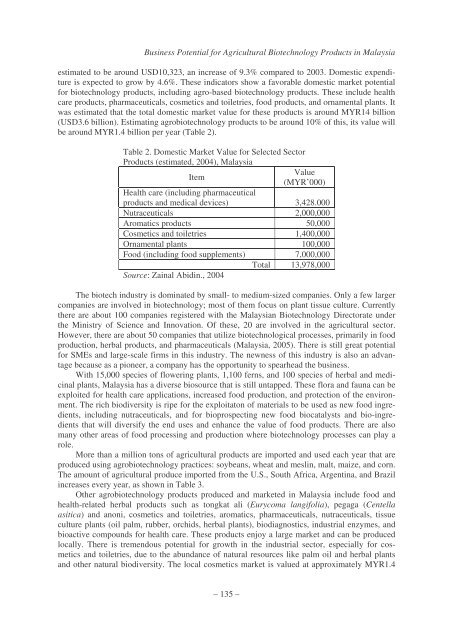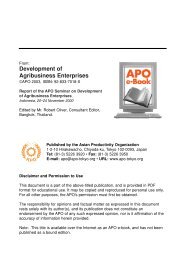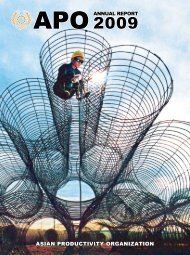Business Potential for Agricultural Biotechnology - Asian Productivity ...
Business Potential for Agricultural Biotechnology - Asian Productivity ...
Business Potential for Agricultural Biotechnology - Asian Productivity ...
Create successful ePaper yourself
Turn your PDF publications into a flip-book with our unique Google optimized e-Paper software.
<strong>Business</strong> <strong>Potential</strong> <strong>for</strong> <strong>Agricultural</strong> <strong>Biotechnology</strong> Products in Malaysia<br />
estimated to be around USD10,323, an increase of 9.3% compared to 2003. Domestic expenditure<br />
is expected to grow by 4.6%. These indicators show a favorable domestic market potential<br />
<strong>for</strong> biotechnology products, including agro-based biotechnology products. These include health<br />
care products, pharmaceuticals, cosmetics and toiletries, food products, and ornamental plants. It<br />
was estimated that the total domestic market value <strong>for</strong> these products is around MYR14 billion<br />
(USD3.6 billion). Estimating agrobiotechnology products to be around 10% of this, its value will<br />
be around MYR1.4 billion per year (Table 2).<br />
Table 2. Domestic Market Value <strong>for</strong> Selected Sector<br />
Products (estimated, 2004), Malaysia<br />
Item<br />
Health care (including pharmaceutical<br />
Value<br />
(MYR’000)<br />
products and medical devices) 3,428.000<br />
Nutraceuticals 2,000,000<br />
Aromatics products 50,000<br />
Cosmetics and toiletries 1,400,000<br />
Ornamental plants 100,000<br />
Food (including food supplements) 7,000,000<br />
Total<br />
Source: Zainal Abidin., 2004<br />
13,978,000<br />
The biotech industry is dominated by small- to medium-sized companies. Only a few larger<br />
companies are involved in biotechnology; most of them focus on plant tissue culture. Currently<br />
there are about 100 companies registered with the Malaysian <strong>Biotechnology</strong> Directorate under<br />
the Ministry of Science and Innovation. Of these, 20 are involved in the agricultural sector.<br />
However, there are about 50 companies that utilize biotechnological processes, primarily in food<br />
production, herbal products, and pharmaceuticals (Malaysia, 2005). There is still great potential<br />
<strong>for</strong> SMEs and large-scale firms in this industry. The newness of this industry is also an advantage<br />
because as a pioneer, a company has the opportunity to spearhead the business.<br />
With 15,000 species of flowering plants, 1,100 ferns, and 100 species of herbal and medicinal<br />
plants, Malaysia has a diverse biosource that is still untapped. These flora and fauna can be<br />
exploited <strong>for</strong> health care applications, increased food production, and protection of the environment.<br />
The rich biodiversity is ripe <strong>for</strong> the exploitaton of materials to be used as new food ingredients,<br />
including nutraceuticals, and <strong>for</strong> bioprospecting new food biocatalysts and bio-ingredients<br />
that will diversify the end uses and enhance the value of food products. There are also<br />
many other areas of food processing and production where biotechnology processes can play a<br />
role.<br />
More than a million tons of agricultural products are imported and used each year that are<br />
produced using agrobiotechnology practices: soybeans, wheat and meslin, malt, maize, and corn.<br />
The amount of agricultural produce imported from the U.S., South Africa, Argentina, and Brazil<br />
increases every year, as shown in Table 3.<br />
Other agrobiotechnology products produced and marketed in Malaysia include food and<br />
health-related herbal products such as tongkat ali (Eurycoma langifolia), pegaga (Centella<br />
asitica) and anoni, cosmetics and toiletries, aromatics, pharmaceuticals, nutraceuticals, tissue<br />
culture plants (oil palm, rubber, orchids, herbal plants), biodiagnostics, industrial enzymes, and<br />
bioactive compounds <strong>for</strong> health care. These products enjoy a large market and can be produced<br />
locally. There is tremendous potential <strong>for</strong> growth in the industrial sector, especially <strong>for</strong> cosmetics<br />
and toiletries, due to the abundance of natural resources like palm oil and herbal plants<br />
and other natural biodiversity. The local cosmetics market is valued at approximately MYR1.4<br />
– 135 –
















